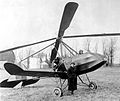Étienne Dormoy
Etienne Dormoy | |
|---|---|
 | |
| Born | 10 February 1885 |
| Died | 28 February 1959 (aged 74) |
| Alma mater | École Centrale de Lille |
| Occupation | Aeronautical engineer |
| Known for | Pioneering contributions to civil and military aviation design |
Étienne Dormoy (Vandoncourt, France, 10 February 1885 – San Diego, USA, 28 February 1959) was an aeronautical engineer and a designer of aircraft.
Biography
Etienne Dormoy graduated in 1906 as an electrical engineer from Institut industriel du Nord (École Centrale de Lille, France). He worked as an aircraft designer for Deperdussin (Deperdussin Monocoque (SPAD)) in France.
He met Harold D. Kantner in France in 1913. He was then seconded to Maximilian Schmitt Aeroplane & Motor Works (Paterson, NJ), wherein he designed the first monocoque fuselage aircraft produced in USA. With this monoplane, Harold D. Kantner won the NY Times race on 4 April 1914. The aircraft was re-engineered as a biplane with a 100 hp engine and tested for military applications at San Diego, CA.
Dormoy returned to France at the beginning of World War I, working for SPAD. In 1917, he joined the French industry delegation in the United States for SPAD technology transfer to Curtiss Aeroplane and Motor Company at Elmwood (Buffalo, NY).
After the war, Dormoy worked for the Engineering Division of the United States Army Air Service at McCook Field (Dayton, OH) from 1919 to 1925. There, he tested aerial applications, including a United States Army Air Service Curtiss JN-4 modified for aerial crop dusting in 1921 .[1] At McCook Field, he designed the ultra-light Dormoy Bathtub in 1924, after two prototypes built in 1919 and 1920. Dormoy earned the 'Dayton Daily News Light Airplane Race and Rickenbacker Trophy' in 1924.
Dormoy joined Buhl Aircraft Company in Detroit, MI, from 1925 to 1932, wherein he designed several types of sport and utility aircraft. Dormoy contributed to the first type-approval of a US aircraft (US type certificate n°1 - March 1927 for Buhl-Verville CA-3/J-4 Airster). Acting as Buhl's chief engineer, Dormoy designed the Buhl Airsedan in 1928 (number built > 60) and the cheap Buhl Bull Pup in 1930 (number built > 100) that were relative successes at the onset of the Great Depression. Buhl Airsedan Spokane Sun God was used to make the first nonstop roundtrip flight across the United States in August 1929. Dormoy also prototyped the Buhl A-1 Autogyro, world first autogyro with rear propulsion motor in 1931.
Dormoy joined Boeing in Seattle, WA, around 1932-1934 and Consolidated Aircraft Corporation of San Diego (Convair-General Dynamics) in San Diego, CA, from 1936 to 1958.
Aircraft designs
-
SPAD Deperdussin Monocoque (1911)
-
SPAD (1917)
-
E. Dormoy (left) and pilot Lieut. J. A. Macready (right) in front of the 1st crop duster airplane (August 3, 1921)
-
Hopper designed by E. Dormoy for the first crop duster airplane
-
Dormoy's Flying Bathtub (1924)
-
Buhl-Verville CA-3 Airster, first certified aircraft (US type approval n°1 - 1927)
-
Buhl Airsedan (1928)
-
Buhl Bull Pup (1930)
-
Etienne Dormoy in front of the Buhl A-1 Autogyro (1931)
-
Boeing P-26 Peashooter (1932)
- Maximilian Schmitt Aeroplane & Motor Works : First monocoque fuselage aircraft produced in USA, derived from Deperdussin Monocoque
- SPAD : US adaptation and production of SPAD aircraft for American Expeditionary Forces and United States Army Air Service, including 189 SPAD S.VII and 893 SPAD S.XIII
- Orenco B
- Dormoy Bathtub
- Buhl-Verville CA-3 Airster : The Airster CA/J-4 is the first type-approved US aircraft (US type certificate n°1 - March 1927)
- Buhl CA-1 Airster
- Buhl Airsedan (number built > 60)
- Buhl Bull Pup (number built > 100)
- Buhl A-1 Autogyro : World first autogyro with rear propulsion motor
- Boeing P-26 Peashooter
- Convair 240
References
- ^ Houser, J.S. (1922), "The Airplane in Catalpa Sphinx Control", Ohio Agricultural Experiment Station, Monthly Bulletin (7): 126–36
{{citation}}: Cite has empty unknown parameter:|month=(help)
- Bruce H. Charnov, From autogiro to gyroplane: the amazing survival of an aviation technology, Praeger, 2003 (ISBN 1567205038 and ISBN 9781567205039), P. 89, 90, 98
- Robert F. Pauley, Michigan Aircraft Manufacturers Images of Aviation Series, Arcadia Publishing, 2009 (ISBN 0738552186 and ISBN 9780738552187)
- Jeffrey R. Davis, M.D., Robert Johnson, Jan Stepanek, M.D, Fundamentals of Aerospace Medicine, Lippincott Williams & Wilkins, 2008 (ISBN 0781774667 and ISBN 9780781774666)
- Bill Gunston, World encyclopaedia of aircraft manufacturers: from the pioneers to the present day, Naval Institute Press, 1993 (ISBN 1557509395 and ISBN 9781557509390)











